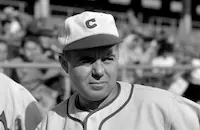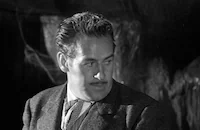Ten Who Dared
Brief Synopsis
Cast & Crew
William Beaudine
Brian Keith
John Beal
James Drury
R. G. Armstrong
Ben Johnson
Film Details
Technical Specs

Synopsis
In 1869, geologist John Wesley Powell, a former Union Army major who lost part of one arm in the war, gathers nine men to help him attempt to chart the Colorado River for the first time. Leaving from Green River, Wyoming in four rowboats are Powell's brother Walter, Jack Sumner, George Bradley, brothers Oramel and Seneca Howland, Englishman Frank Goodman, Andrew Hall, Billy "Missouri" Hawkins and William Dunn. At first, spirits are high, but soon personality differences among the men become clear. Frank tempts Missouri, a recovering alcoholic trying to escape his past, to drink smuggled whiskey, while Bill wants to direct the group according to his astrological charts. One day, Walter discovers that young Andrew is hiding a mongrel puppy named Jarvie, and orders the boy to kill the dog. When a distraught Andrew takes too long, Powell takes over, but also cannot bring himself to shoot the animal. Later, at the first set of rapids, the men guide the boats through with ease, then stop to pan for gold. When Walter's rough demeanor bothers the others, Powell reveals that his brother was tortured during the Civil War in the Andersonville prison camp. Although this inspires George to treat Walter more kindly, Walter discerns that George is a Southerner and begins to taunt him maliciously. Powell signals the boats to stop before the next set of rapids, but Missouri, who has given in to Frank's goading and become drunk, is too busy fighting with the Englishman to hear the order, and the two are pitched overboard. Walter rescues them from the rushing water, but the boat is unsalvageable. Upon inspecting the ruins of the boat, the men discover the whiskey barrel, but Walter shoots it to drain the liquid. Although Powell notes the growing tension between Walter and George, he ignores it, overwhelmed by the beauty of the vistas. At one stop, they are joined by tracker Jim Baker, whose Indian wife warns them that a huge, deadly waterfall lies ahead. She recounts the Indian legend about the rapids: Long ago, after an Indian chief's wife dies, he grieves so excessively that one of the gods leads him to see her in paradise. In order to block the path so the chief can never return, the god turns the trail into a raging river that cannot be passed. Although the men are frightened by the story, Powell's calculations suggest that no such waterfall exists. Despite Powell's assurance, Frank determines to leave the party, but first admits that Missouri's drunkenness was his fault. When the rest resume travel, Powell secretly worries about the overloaded boats and Walter's increasing antagonism. At a stop soon after, Walter insults Bill, who punches him, but George intervenes and insists that the real fight is theirs. The two battle until Powell sees them, and when Walter calls his brother "a cripple," Powell knocks him unconscious. Soon after, George leaves to hunt in the mountains and Walter secretly follows him with a pistol. The two exchange gunfire, but as soon as George has Walter trapped at close range, he declares that the war is long over, and offers Walter his hand. Hours later, the two return to the camp together, and Powell is pleased to see them join together in song. At the next stop, Oramel provokes the others by claiming that Powell is hiding a discovery of gold, but when they confront the major, he reveals that he is merely collecting fossils for a museum. Bill asks to join Powell, but soon infuriates him by teasing a rattlesnake. Soon after, Bill repeats his mischief and is promptly bitten. Powell sucks out the poison, but they are forced to camp for days until Bill's fever recedes. They take off again among gorgeous cliffs of crystallized lava, a landscape carved by eons of erosion. Inspired, Powell wants to stop frequently to examine the rock, but the edgy men want to move forward, especially after Missouri announces that they have flour enough for just one more meal. At a stop to scout upcoming rapids, Powell falls while exploring the mountains, and must hold on with his one good hand. Luckily, Jarvie hears his call and leads the others to the rescue. Once in the hills, Oramel declares that it will be easier to reach the nearest town by land rather than river, despite Powell's insistence that the river will be faster. Back at camp, they discover that Jarvie has eaten the last biscuits, prompting Andrew to sleep with a loaded pistol to protect the dog. Powell stays awake all night charting the course ahead, and upon deducing that the river is significantly shorter than the land route, asks Walter, whom the men now trust, to convince them to continue with him. Walter, however, suspects that his brother may be putting the success of the expedition before the men's safety and, in the morning, refuses to be involved in the decision. Bill announces that they will cross the mountains, and when Powell points out that they will surely die of thirst, especially without an experienced guide, Bill demands at gunpoint that he join them. Powell leaps into a boat to escape, and is followed by Walter and Andrew, with Jack, Frank and Missouri taking a second boat. After finally releasing Jarvie so that he can join Andrew, Bill takes Oramel and Seneca and climbs into the mountains. Although they manage to find their way to the peak, they are soon beset by hostile Ute Indians, who are searching for the murderers of an Indian squaw. While Bill convinces the Indians that he and the others are innocent, the six remaining travelers reach the last set of rapids, and after a harrowing trip, are pleased to discover that they have safely reached Arizona. Soon after, the United States Congress honors the whole group with a plaque for conquering the mighty Colorado. One year later, the bodies of Bill, Oramel and Seneca are discovered in the hills, murdered by Utes.

Director
William Beaudine
Cast

Brian Keith

John Beal
James Drury
R. G. Armstrong

Ben Johnson
L. Q. Jones
Dan Sheridan
David Stollery
Stan Jones
David Frankham
Pat Hogan

Ray Walker
Jack Bighead

Roy Barcroft
Dawn Little Sky
Chickie
Crew
James Algar
Gordon Avil
Hilyard Brown
Carroll Clark
Robert O. Cook
Walt Disney
Joseph S. Dubin
Russ Haverick
Julia Ward Howe
Ub Iwerks
Stan Jones
Chuck Keehne
Evelyn Kennedy
Emile Kuri
Harry M. Lindgren
Otis "dock" Marston
Pat Mcnalley
Norman Palmer
William Steffe
Nipo Strongheart
Oliver Wallace
Cotton Warburton
Lawrence Edward Watkin
Lawrence Edward Watkin
Albert Whitlock

Film Details
Technical Specs

Quotes
Trivia
Notes
The working title of this film was The Colorado Experiment. Opening credits include the following written statement: "Filmed with the cooperation of: Grand Canyon National Park, Arches National Monument." The film begins with a voice-over narration describing the 1,000 miles of uncharted territory remaining along the Colorado River, and the first man to dare to traverse it: John Wesley Powell, a teacher, scientist and former Union major. The narrator goes on to say that the film provides an authentic account of the journey, taken directly from Powell's records. This is followed by voice-over narration by John Beal as "Powell," which continues intermittently throughout the film.
As depicted in the film, Powell (1834-1902) led a three-month expedition in 1869 to traverse the Colorado River from Wyoming to Arizona for the first time, departing with nine volunteers and returning with six. According to an October 1953 Los Angeles Times news item, Walt Disney first considered making Ten Who Dared in 1953, but the Los Angeles Examiner review states that the studio abandoned the project when it proved impossible for the crew to navigate the treacherous Colorado River rapids. Studio press materials report that Disney then tried three more times until, six years later, the crew was able to follow Powell's original path successfully.
According to the Hollywood Reporter review, upon the start of production, the studio planned the film as a television program, but soon decided to give it a theatrical release. Studio press materials assert that the crew recreated the expedition as faithfully as possible, creating replicas of Powell's original rowboats and following 370 miles of river from Lee's Ferry in Arizona, through the Grand Canyon, to Moab, UT. A program promoting the film aired on the Walt Disney Presents television show on December 16, 1960.

Miscellaneous Notes
Released in United States Fall October 1960
Released in United States Fall October 1960











